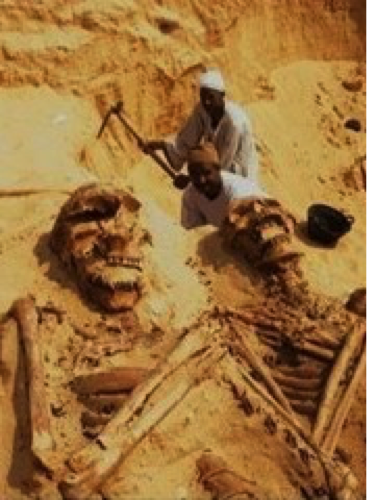Subtotal: $561.75
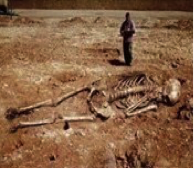 True or false; At first they were foretold by The Book of Enoch in Chapter 7;
True or false; At first they were foretold by The Book of Enoch in Chapter 7;
3 became pregnant, and they bare great giants, whose height was three thousand ells: Who consumed
4 all the acquisitions of men. And when men could no longer sustain them, the giants turned against
5 them and devoured mankind. And they began to sin against birds, and beasts, and reptiles, and
6 fish, and to devour one another’s flesh, and drink the blood. Then the earth laid accusation against the lawless ones. Then they were mentioned in ancient mythology, then after that they ended up being in horror movies and films like LORD OF THE RINGS.
Where did they come from, what is the origin?
Listen to the article on our Youtube channel
Well, the Book of Enoch also had something additional to say about that Giants race, “Chapter 6“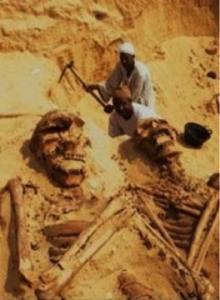
1 And it came to pass when the children of men had multiplied that in those days were born unto them beautiful and comely daughters.
2 And the angels, the children of the heaven, saw and lusted after them, and said to one another: ‘Come, let us choose us wives from among the children of men
3 and beget us children.’ And Semjaza, who was their leader, said unto them: ‘I fear ye will not
4 indeed agree to do this deed, and I alone shall have to pay the penalty of a great sin.’ And they all answered him and said: ‘Let us all swear an oath, and all bind ourselves by mutual imprecations
5 not to abandon this plan but to do this thing.’ Then sware they all together and bound themselves
6 by mutual imprecations upon it. And they were in all two hundred; who descended in the days of Jared on the summit of Mount Hermon, and they called it Mount Hermon, because they had sworn
7 and bound themselves by mutual imprecations upon it. And these are the names of their leaders: Samlazaz, their leader, Araklba, Rameel, Kokablel, Tamlel, Ramlel, Danel, Ezeqeel, Baraqijal,
8 Asael, Armaros, Batarel, Ananel, Zaq1el, Samsapeel, Satarel, Turel, Jomjael, Sariel. These are their chiefs of tens.

Chapter 7
1 And all the others together with them took unto themselves wives, and each chose for himself one, and they began to go in unto them and to defile themselves with them, and they taught them charms
2 and enchantments, and the cutting of roots, and made them acquainted with plants. read The book of Enoch and learn more.
Then, out of the sudden they appeared in the middle of nowhere in the desert location in Saudi Arabia during and excavation by Aramco their exploration team was digging for natural gas, the site was located in one of the most rugged and driest deserts in the world it is of a huge size, The Desert of the Empty Quarters, south east of the Arabian desert.
The Aramco exploration team revealed phenomenal size remains of Homo sapiens like skeletons which were referred to by local expert theologians as the race of Aad of the nation of prophet HUD, mentioned in the Quran. Quote from wikipeida: (Hud (Arabic: هود) is the name of a prophet of Islam. The eleventh sura of the Qur’an, Hud, is named after him, though the narrative of Hud comprises only a small portion of the sura.[1] Although Hud is, at times, identified with the patriarch Eber, his true Biblical identity remains uncertain.
Hud is frequently mentioned alongside fellow prophet Saleh, as both were pious messengers sent to pre-Ishmaelite Arabia. Hud himself was sent to the state of Aad, which was a powerful, but arrogant, town).
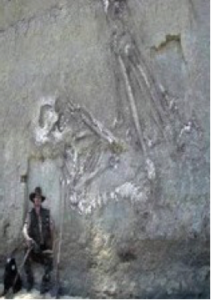
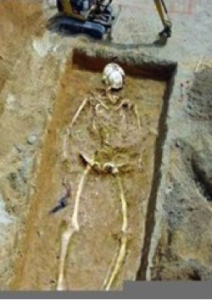
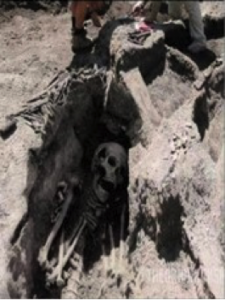
Here is a more elaborate reference about them by the famous historian interpreter IBN KATHIER; The people of ‘Ad lived many years in the windswept hills of an area between Yemen and Oman. They were physically well built and renowned for their craftsmanship especially in the construction of tall buildings with lofty towers. They were outstanding among all the nations in power and wealth, which, unfortunately, made them arrogant and boastful. Their political power was held in the hand of unjust rulers, against whom no one dared to raise a voice.
They while recognizing the One God, worshiped other gods, also, including idols.
God sent a prophet from among them. This prophet was Hud.
Ibn Jarir reported that he was Hud Ibn Shalikh, Ibn Arfakhshand, Ibn Sam, Ibn Noah (PBUH). He also reported that Prophet Hud (PBUH) was from a tribe called Ad Ibn Us Ibn Sam Ibn Noah, who were Arabs living in Al Ahqaf in Yemen between Oman and Hadramaut, on a land called Ashar stretching out into the sea. The name of their valley was Mughiith.
Allah the Almighty states: And to Ad people We sent their brother Hud. (Ch 11:50-57 Quran).
A day came when they found the sky full of clouds. Hud’s people were glad as they came out of their tents crying: “A cloud, which will give us rain!”
The storm raged for 8 days and 7 nights.
Almighty Allah recounts: Then when they saw it as a dense cloud coming towards their valleys, they said: “This is a cloud bringing us rain!” Nay but it is that torment which you were asking to be hastened! a wind wherein is a painful torment! Destroying everything by the command of its Lord! (Ch 46:24-25 Quran)
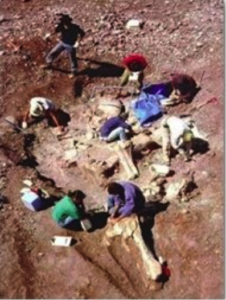 Allah the Exalted described it thus: And as for Ad, they were destroyed for a furious violent wind which Allah imposed on them for 7 nights and 8 days in succession, so that you could see men lying overthrown (destroyed) as if they were hollow trunks of palm trees! (Ch 69:6-7 Quran)
Allah the Exalted described it thus: And as for Ad, they were destroyed for a furious violent wind which Allah imposed on them for 7 nights and 8 days in succession, so that you could see men lying overthrown (destroyed) as if they were hollow trunks of palm trees! (Ch 69:6-7 Quran)
That violent gale did not stop until the entire region was reduced to ruins and its wicked people destroyed, swallowed by the sands of the desert. Only Hud and his followers remained unharmed. They migrated to Hadramaut and lived there in peace, worshiping Allah, their true Lord.
Here is what the Jewish encyclopedia says about Eber who is believed to be Hud: The eponymous ancestor of the Hebrews; grandson of Arphaxad and great-grandson of Shem; father of Joktan, the ancestor of the Arabs, and of Peleg, among whose progeny, in the fifth generation, was Abram (Gen. x. 22, 25-30; xi. 18-26).
The word “Eber” signifies “the region beyond.” Of the nine words in Genesis that designate Shem’s descendants, at least two, “Arphaxad” and “Serug” (Gen. xi. 10, 21), are identical with the names of districts: the former indicating the district of Arrapachitis on the upper Zab, the latter the place where Abu Zaid of “Saruj,” the hero of Ḥariri’s “Maḳamat,” had his home. The conclusion is therefore warranted that the term “Eber” originally designated a district.
The use of “Eber” as a “nomen appellativum” is common; it denotes originally “that which is beyond.” This explains the fact that, in the genealogy of the Semites, Abraham and, especially, Israel are called descendants of “Eber”; for if “Eber” had been originally the name of a person, it would be strange that Abraham should have been so closely linked with him, since Eber was not his immediate ancestor, but one six times removed. It is because “Eber” was originally the name of a region that it took so important a place in the genealogical tree.
“Eber” designates the region occupied longest and most continuously by the peoples that traced their descent from Shem through Arphaxad. This is apparent in the words, “And ships shall come from the coast of Chittim [Kition, on the island of Cyprus], and shall afflict Asshur, and shall afflict Eber” (Num. xxiv. 24). Here “Eber” designates a country in the neighborhood of Assyria, and to a certain extent forming a part of it—the country beyond the Euphrates. The importance of that river for anterior Asia may serve to explain the fact that the country beyond the Euphrates was designated κατ’ ἐξοχὴν as the “region beyond.”
The Babylonian name corresponding to the Hebrew “‘Eber ha-Nahar” is “‘Ebir Nari” (comp. Winckler, “Gesch. Israel’s,” i. 223, note 1). It occurs in an inscription of Assur-bel-kala (Hommel, “Ancient Hebrew Tradition,” p. 195, line 5) about 1100B.C.In I Kings v. 4 (A. V. iv. 24) “‘Eber ha-Nahar” is descriptive of the limits of Solomon’s kingdom.
Hommel’s opinion is that the region beyond Wadi Sirḥan is indicated; but see Ed. König, “Fünf Neue Arabische Landschaftsnamen im Alten Testament,” 1901, p. 44.
Enjoy the pictures and send us your comment.
Adam El Masri



 24V Split Air Conditioner for Parking Truck, Van, Tractor, DC
24V Split Air Conditioner for Parking Truck, Van, Tractor, DC 